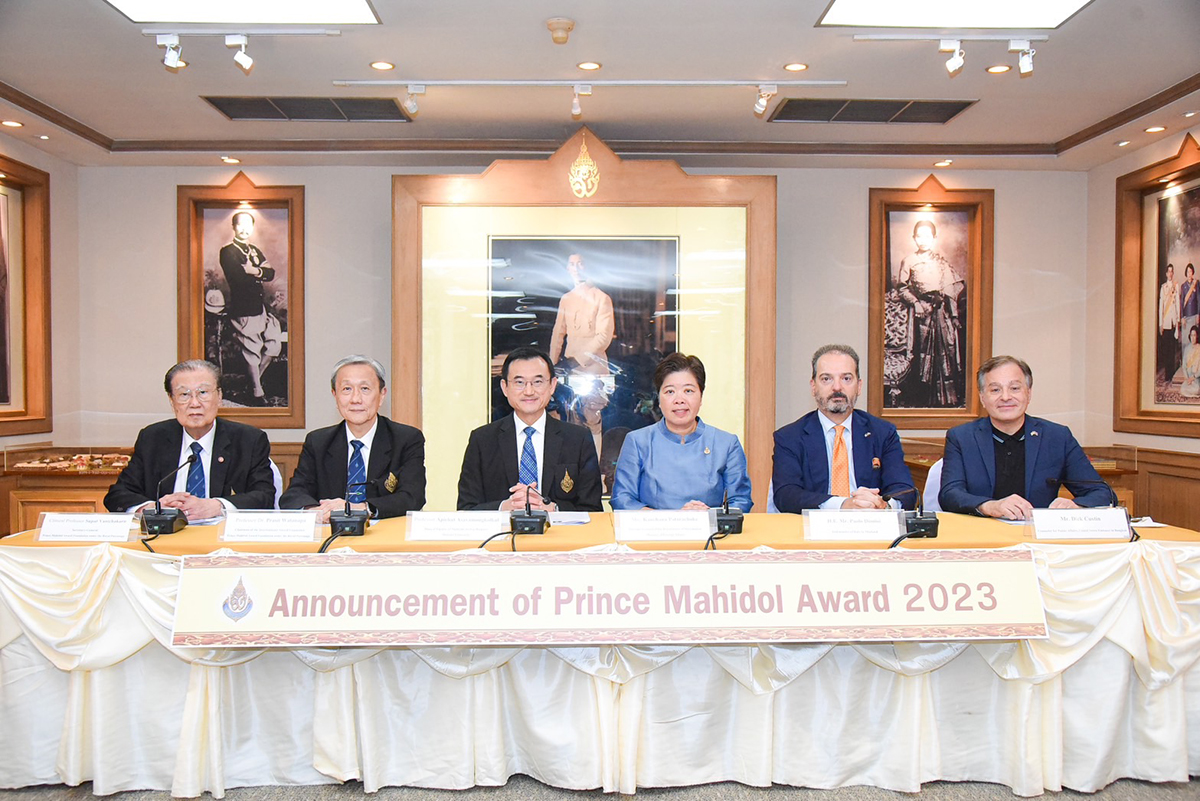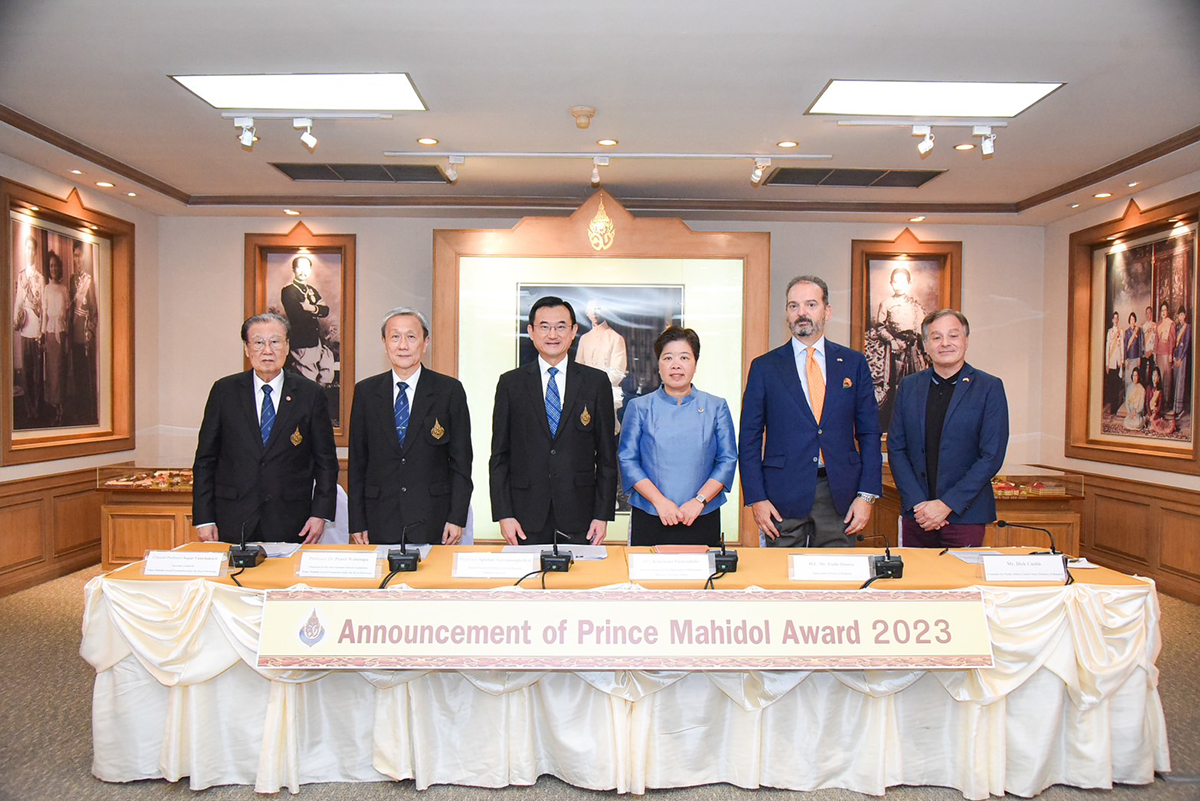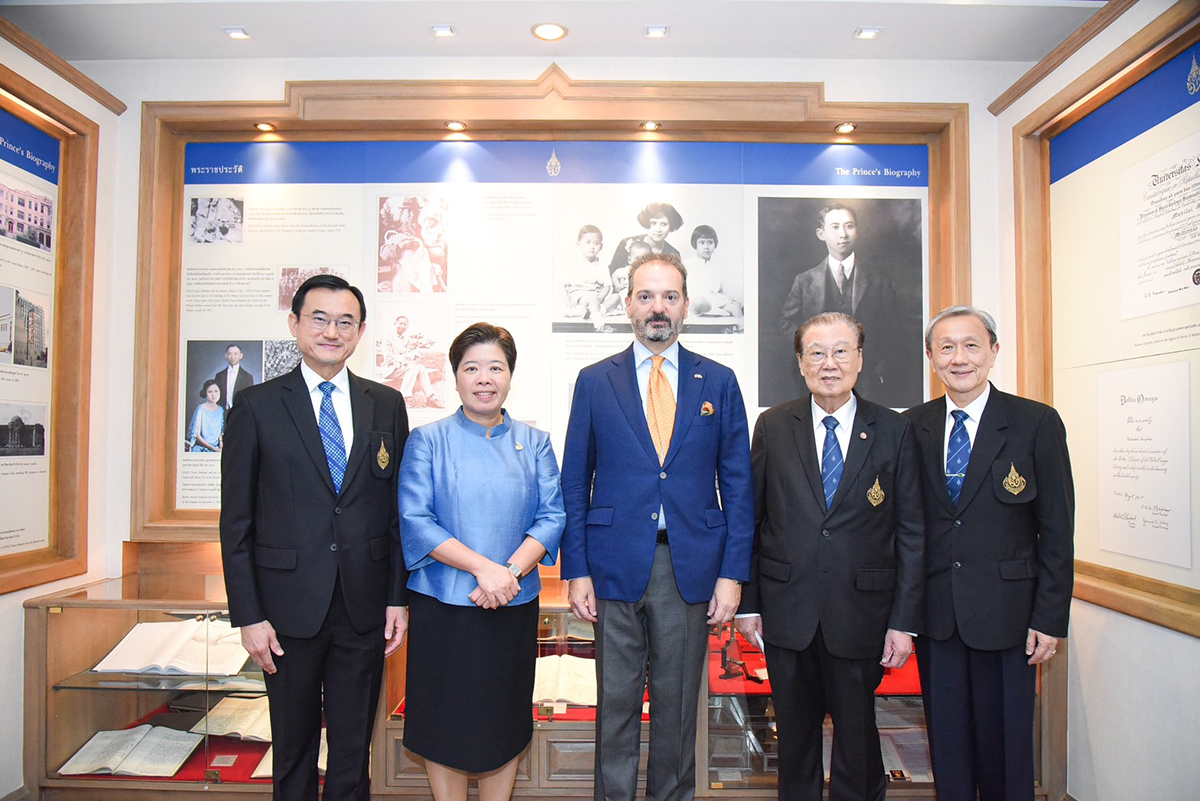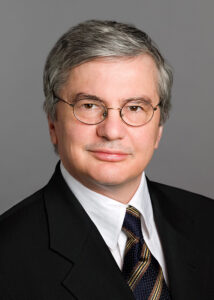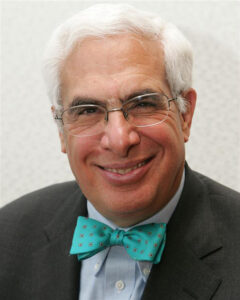Today (16 November 2023) at 13.30 hrs., the annual Joint Press Conference was held to announce the 32nd Prince Mahidol Award Laureates for 2023 at the Prince Mahidol Memorial Room, 2nd Floor, Syamindra Building, Siriraj Hospital, and addressed by Professor Apichat Asavamongkolkul, Dean of the Faculty of Medicine, Siriraj Hospital, Mahidol University as Vice President of the Prince Mahidol Award Foundation; Clinical Professor Supat Vanichakarn, Secretary General of the Prince Mahidol Award Foundation under the Royal Patronage; Mrs. Kanchana Patarachoke, Director-General of the Department of Information, Ministry of Foreign Affairs as Chairperson of the Sub-Committee on Public Relations of the Prince Mahidol Award Foundation; and Professor Dr.Prasit Watanapa, Chairman of the International Award Committee of the Prince Mahidol Award Foundation.
The Prince Mahidol Award 2023 in the field of Medicine is awarded to
Professor Napoleone Ferrara, M.D., USA / Italy.
The Prince Mahidol Award 2023 in the field of Public Health is awarded to
Dr. Barry H. Rumack, M.D., USA.
In addition to 92 nominations from 31 countries in 2023, the Scientific Advisory Committee also meticulously reviewed past applications from 2020 – 2022 before submitting
a short list of candidates to the International Award Committee for the latter’s recommendation to the Board of Trustees, which had a meeting on 1 November 2023, presided over by H.R.H. Princess Maha Chakri Sirindhorn, to make the final selection for the Prince Mahidol Award 2023.
For over the past 31 years, the Prince Mahidol Award has been conferred to
94 individuals, groups of individuals and institutions. Among the Laureates, 4 were Thai nationals. In 1996, the Prize in Medicine was awarded to both Professor Dr. Prasong Tuchinda for studying the effects of Dengue virus to children with disabilities with dengue hemorrhagic fever, and Dr. Suchitra Nimmannitya for identifying the severity classification of dengue hemorrhagic fever. In addition, the 2009 Award in Public Health was conferred to Dr. Wiwat Rojanapithayakorn for his project to promote the use of condom to prevent the spread of HIVs, and Mr. Mechai Viravaidya for his communication campaign to disseminate the use of condoms.
The following Prince Mahidol Laureates have won the Nobel Prize at a later date:
(1) Professor Barry J. Marshall from Australia received the Prince Mahidol Award in the field of Public Health in 2001 and the Nobel Prize in the field of Medicine in 2005 for the discovery of the new bacterium identified as Helicobacter pylori that caused severe gastritis and its sensitivity to particular antibacterial drugs;
(2) Professor Harald Zur Hausen from Germany received the Prince Mahidol Award in the field of Medicine in 2005 and the Nobel Prize in the field of Medicine in 2008 for the discovery of the human papilloma virus HPV16 and HPV18 from the cancer tissue and elucidated how the viruses turn normal cells into cancer cells;
(3) Professor Dr. Satoshi Omura from Japan received the Prince Mahidol Award in the field of Medicine in 1997 and the Nobel Prize in the field of Medicine in 2015 for the discovery and development of various pharmaceuticals originally occurring in microorganisms. His research group isolated a strain of Streptomyces Avermitilis that produce the anti-parasitical compound avermectin which contributed to the development of the drug ivermectin that is currently used against river blindness, lymphatic filariasis, and other parasitic infections;
(4) Professor Tu You You, a member of the China Cooperative Research Group on Qinghaosu and its Derivatives as Antimalarials from China, received the Prince Mahidol Award in the field of Medicine in 2003 in an organisational category and the Nobel Prize in the field of Medicine in 2015 for the discovery of Qinghaosu as a new drug for treatment of the P.falciparum malaria;
(5) Sir Gregory Paul Winter from the United Kingdom received the Prince Mahidol Award in the field of Medicine in 2016 and the Nobel Prize in the field of Chemistry in 2018 for his pioneership in the field of antibody engineering and modification technology. He invented techniques to humanise antibodies for therapeutic uses, which later led to the creation of cutting-edge therapeutic drugs;
(6) Professor Dr. Katalin Karikó from Hungary/the United States of America and Professor Drew Weissman from the United States of America received the Prince Mahidol Award in the field of Medicine in 2021 and the Nobel Prize in the field of Medicine in 2023 for their timely research on the development of COVID-19 mRNA vaccine in response to the pandemic, making it possible to reduce the infection rate and severe illness. Their studies also serve as an important tool to contain the spread of the virus around the world, proving to be beneficial to public health and the lives of millions of patients around the world.
The Prince Mahidol Award Foundation under the Royal Patronage was established on 1 January 1992 in commemoration of the centenary of the birth of His Royal Highness Prince Mahidol of Songkla. With Her Royal Highness Princess Maha Chakri Sirindhorn as the President, the Foundation annually presents two Prince Mahidol Awards to individual(s) or institution(s) with outstanding and exemplary contributions to the advancement of the international medical and public health services. Each Award consists of a medal, a certificate, and a prize to the sum of 100,000 USD
Her Royal Highness Princess Maha Chakri Sirindhorn will preside over the Presentation Ceremony of the Prince Mahidol Award 2023 at the Chakri Throne hall on 24 January 2024 at 16.30 hours. Prior to the Ceremony, Siriraj Hospital, as a founder of the Prince Mahidol Award, will invite the 2023 Prince Mahidol Award Laureates to give lectures on their achievements on 23 January 2024.
Prince Mahidol Award Laureate 2023
In the Field of Medicine
Distinguished Professor of Ophthalmology and Pathology
Senior Deputy Director for Basic Sciences, Moores Cancer Center
School of Medicine, University of California San Diego
San Diego, California,
USA / Italy
Professor Napoleone Ferrara earned his M.D. from the University of Catania in Italy and completed an internship at Oregon Health & Science University, USA. During his postdoctoral fellowship at the University of California in the United States of America, Prof. Ferrara conducted a research in Reproductive Endocrinology and Cancer.
Prof. Ferrara discovered vascular endothelial growth factor (VEGF) and the identification and purification of VEGF as a potent mitogen specifically for vascular endothelial cells.
His laboratory has conducted extensive researches into VEGF’s biochemistry, molecular biology, its receptors, and the mechanisms of VEGF-induced angiogenesis, particularly in normal and pathological conditions, such as cancer and age-related macular degeneration (AMD).
Prof. Ferrara’s research has resulted in the development of the anti-VEGF antibody, Bevacizumab, which is used in the treatment of highly vascularized and aggressive cancers. His pioneer work included the development of the anti-VEGF Fab fragment known as Ranibizumab, and the scientific breakthrough has significantly improved the quality of life for many AMD patients, especially in an aging society.
The Laureate’s contributions to VEGF and anti-VEGF therapy have led to the worldwide use of anti-VEGF drugs and benefited millions of patients around the world.
Prince Mahidol Award Laureate 2023
In the Field of Public Health
Barry H. Rumack, M.D.
Professor Emeritus of Pediatrics and Emergency Medicine,
University of Colorado School of Medicine
USA
Dr. Barry H. Rumack earned his Doctor of Medicine degree from the University of Wisconsin School of Medicine and Public Health. He was also a clinical research fellow at the National Institutes of Health, a pediatric house staff, and subsequently a fellow at the Colorado Poison Center. His professional experiences, thus, provided him with a foundation for his future groundbreaking work in clinical toxicology.
In 1973, Dr. Rumack undertook a clinical fellowship with Dr. Henry Matthew, MD at the Royal Infirmary of Edinburgh in Scotland. During this time, he became deeply interested in the pharmacologic and toxicologic characteristics of a commonly used drug, paracetamol whose toxicity is responsible for 40-70 percent of acute liver failure cases worldwide. Collaborating with Professor Matthew, he collected a crucial dataset comprising 34 cases of paracetamol overdose and combined it with 30 previously published cases. This collaboration resulted in the creation of the iconic Rumack–Matthews nomogram, published in 1975. This nomogram, with its easy-to-understand graphs of paracetamol level, time after ingestion, and risk of liver toxicity, has allowed doctors all over the world to appropriately diagnose paracetamol toxicity. Through his study on the efficacy of N-acetylcysteine as its antidote, a treatment protocol was formed which became the global standard for managing paracetamol toxicity and led to a drastic reduction in liver failure from 54 percent to nearly 0 percent. Some version of this protocol is still used in emergency rooms all across the world today.
Over the past 4 decades, Dr. Rumack has continued to be an influential figure in the field of medical toxicology. He pioneered the use of Poisindex as a poison information database and heralded in the digital age for poison centers and hospitals throughout the world, enhancing the efficiency and accuracy of poison information retrieval and provision. His work with paracetamol toxicity also continued, resulting in ever-improving and more individualized patient management. His passion for science, and his innovative spirit, combined with his unwavering commitment to deliver the best treatment possible for patients have helped save lives, improve treatment outcomes, and inspire countless physicians to strive for the betterment of their own patients.

